Data Structures and Algorithms
- Introduction to Data Structures and Algorithms
- Time and Space Complexity Analysis
- Big-O, Big-Theta, and Big-Omega Notations
- Recursion and Backtracking
- Divide and Conquer Algorithm
- Dynamic Programming: Memoization vs. Tabulation
- Greedy Algorithms and Their Use Cases
- Understanding Arrays: Types and Operations
- Linear Search vs. Binary Search
- Sorting Algorithms: Bubble, Insertion, Selection, and Merge Sort
- QuickSort: Explanation and Implementation
- Heap Sort and Its Applications
- Counting Sort, Radix Sort, and Bucket Sort
- Hashing Techniques: Hash Tables and Collisions
- Open Addressing vs. Separate Chaining in Hashing
- DSA Questions for Beginners
- Advanced DSA Questions for Competitive Programming
- Top 10 DSA Questions to Crack Your Next Coding Test
- Top 50 DSA Questions Every Programmer Should Practice
- Top Atlassian DSA Interview Questions
- Top Amazon DSA Interview Questions
- Top Microsoft DSA Interview Questions
- Top Meta (Facebook) DSA Interview Questions
- Netflix DSA Interview Questions and Preparation Guide
- Top 20 DSA Interview Questions You Need to Know
- Top Uber DSA Interview Questions and Solutions
- Google DSA Interview Questions and How to Prepare
- Airbnb DSA Interview Questions and How to Solve Them
- Mobile App DSA Interview Questions and Solutions
DSA Interview Questions
- DSA Questions for Beginners
- Advanced DSA Questions for Competitive Programming
- Top 10 DSA Questions to Crack Your Next Coding Test
- Top 50 DSA Questions Every Programmer Should Practice
- Top Atlassian DSA Interview Questions
- Top Amazon DSA Interview Questions
- Top Microsoft DSA Interview Questions
- Top Meta (Facebook) DSA Interview Questions
- Netflix DSA Interview Questions and Preparation Guide
- Top 20 DSA Interview Questions You Need to Know
- Top Uber DSA Interview Questions and Solutions
- Google DSA Interview Questions and How to Prepare
- Airbnb DSA Interview Questions and How to Solve Them
- Mobile App DSA Interview Questions and Solutions
Data Structures and Algorithms
- Introduction to Data Structures and Algorithms
- Time and Space Complexity Analysis
- Big-O, Big-Theta, and Big-Omega Notations
- Recursion and Backtracking
- Divide and Conquer Algorithm
- Dynamic Programming: Memoization vs. Tabulation
- Greedy Algorithms and Their Use Cases
- Understanding Arrays: Types and Operations
- Linear Search vs. Binary Search
- Sorting Algorithms: Bubble, Insertion, Selection, and Merge Sort
- QuickSort: Explanation and Implementation
- Heap Sort and Its Applications
- Counting Sort, Radix Sort, and Bucket Sort
- Hashing Techniques: Hash Tables and Collisions
- Open Addressing vs. Separate Chaining in Hashing
- DSA Questions for Beginners
- Advanced DSA Questions for Competitive Programming
- Top 10 DSA Questions to Crack Your Next Coding Test
- Top 50 DSA Questions Every Programmer Should Practice
- Top Atlassian DSA Interview Questions
- Top Amazon DSA Interview Questions
- Top Microsoft DSA Interview Questions
- Top Meta (Facebook) DSA Interview Questions
- Netflix DSA Interview Questions and Preparation Guide
- Top 20 DSA Interview Questions You Need to Know
- Top Uber DSA Interview Questions and Solutions
- Google DSA Interview Questions and How to Prepare
- Airbnb DSA Interview Questions and How to Solve Them
- Mobile App DSA Interview Questions and Solutions
DSA Interview Questions
- DSA Questions for Beginners
- Advanced DSA Questions for Competitive Programming
- Top 10 DSA Questions to Crack Your Next Coding Test
- Top 50 DSA Questions Every Programmer Should Practice
- Top Atlassian DSA Interview Questions
- Top Amazon DSA Interview Questions
- Top Microsoft DSA Interview Questions
- Top Meta (Facebook) DSA Interview Questions
- Netflix DSA Interview Questions and Preparation Guide
- Top 20 DSA Interview Questions You Need to Know
- Top Uber DSA Interview Questions and Solutions
- Google DSA Interview Questions and How to Prepare
- Airbnb DSA Interview Questions and How to Solve Them
- Mobile App DSA Interview Questions and Solutions
Interview Questions for Freshers from Non-Tech Backgrounds
Entering the job market as a fresher from a non-technical background can be both exciting and challenging. The tech industry, while often associated with coding and engineering, offers numerous opportunities for non-tech professionals in roles like customer service, marketing, HR, and project management. These positions value soft skills, adaptability, and a willingness to learn, making them accessible to candidates from diverse academic backgrounds.
This comprehensive guide covers 30 real interview questions frequently asked of non-tech freshers, complete with detailed explanations, actionable tips, and example answers. Whether you’re aiming for a customer-facing role or a support position in a tech company, this post will equip you with the tools to shine. To further boost your preparation, sign up for our free courses to access tailored interview resources and stay ahead of the curve.
Key Points
- Common Questions: Non-tech freshers often face questions about personal background, strengths, weaknesses, career goals, and customer service scenarios, focusing on soft skills and adaptability.
- Preparation is Key: Researching the company, practicing answers, and showcasing transferable skills can significantly boost your chances of success.
- Soft Skills Matter: Employers value communication, teamwork, and problem-solving, which are critical for non-technical roles in tech companies.
- Learning Opportunities: Even without a tech background, demonstrating a willingness to learn basic technical concepts can set you apart.
Why This Matters
Transitioning into the tech industry as a non-tech fresher can feel daunting, but many roles, such as customer service, sales, or project management, prioritize soft skills over technical expertise. By preparing for common interview questions, you can confidently showcase your abilities and fit for the role.
How to Prepare
- Research the Company: Understand the company’s mission, values, and recent projects to tailor your answers.
- Practice Answers: Use the STAR method (Situation, Task, Action, Result) for behavioral questions to structure your responses clearly.
- Highlight Transferable Skills: Emphasize skills like communication, problem-solving, and adaptability, which are valuable in any role.
- Consider Learning Basics: Familiarize yourself with basic tech concepts through resources like our Data Structures and Algorithms course to bridge any knowledge gaps.
What to Expect
You’ll likely encounter a mix of behavioral, situational, and general questions designed to assess your personality, work ethic, and potential to grow within the company. Below, we dive into 30 real, commonly asked questions with detailed guidance to help you succeed.
Common Non-Technical Interview Questions
Non-technical questions focus on your personality, communication skills, and cultural fit. Below are 20 commonly asked questions, each with insights on why they’re asked, how to answer effectively, and example responses.
1. Tell Me About Yourself
Why It’s Asked: This icebreaker helps interviewers gauge your background, communication style, and relevance to the role.
How to Answer: Keep it concise (2-3 minutes), starting with your education, highlighting relevant skills or experiences, and ending with why you’re excited about the role. Avoid reciting your resume.
Example Answer:
“I recently graduated with a degree in Business Administration from [Your University]. During my studies, I honed my organizational and communication skills through group projects and a marketing internship where I coordinated campaigns that increased client engagement by 10%. I’m excited to bring these skills to [Company Name] to contribute to your innovative projects.”
2. What Are Your Strengths and Weaknesses?
Why It’s Asked: To assess your self-awareness and how your skills align with the job.
How to Answer: Choose 2-3 strengths relevant to the role with examples. For weaknesses, select a genuine one and explain how you’re improving.
Example Answer:
“My strengths include adaptability and teamwork. In my internship, I quickly learned new CRM software, improving team efficiency by 15%. My weakness is that I sometimes overthink decisions, but I’ve been working on this by setting clear priorities and seeking feedback, which has helped me make quicker, confident choices.”
3. Why Do You Want to Work Here?
Why It’s Asked: To see if you’ve researched the company and are genuinely interested.
How to Answer: Research the company’s mission, values, and recent achievements. Connect these to your skills and goals.
Example Answer:
“I’m drawn to [Company Name]’s commitment to sustainable technology, which aligns with my passion for environmental impact. My strong organizational skills and eagerness to learn make me excited to contribute to your innovative projects, like your recent [specific project].”
4. Where Do You See Yourself in Five Years?
Why It’s Asked: To evaluate your career aspirations and alignment with the company’s growth opportunities.
How to Answer: Focus on professional growth within the industry, showing ambition while remaining realistic.

Example Answer:
“In five years, I see myself as a skilled project coordinator, taking on more responsibilities and driving impactful initiatives. I believe [Company Name]’s focus on professional development, as seen in your [specific program], will help me achieve this.”
5. What Is Your Greatest Achievement?
Why It’s Asked: To understand what you value and how you define success.
How to Answer: Choose a relevant achievement, describe the situation, your role, and the outcome using the STAR method.
Example Answer:
“My greatest achievement was leading a college fundraiser that raised $5,000 for a local charity. I organized the team, secured sponsors, and managed logistics, resulting in a 20% increase over our goal, teaching me leadership and planning skills.”
6. How Do You Handle Pressure or Stress?
Why It’s Asked: To assess your resilience in high-pressure situations.
How to Answer: Share a specific example, focusing on your coping strategies and positive outcomes.
Example Answer:
“During a group project with a tight deadline, I managed stress by creating a detailed schedule and delegating tasks. This kept us on track, and we delivered a high-quality presentation on time, reinforcing my ability to stay calm under pressure.”
7. Describe a Time When You Worked in a Team
Why It’s Asked: To evaluate your collaboration and interpersonal skills.
How to Answer: Use the STAR method to highlight your role and the team’s success.
Example Answer:
“In my internship, I worked with a marketing team to launch a campaign. My role was to coordinate content creation. By facilitating regular check-ins, we delivered the campaign on time, increasing social media engagement by 25%.”
8. What Motivates You?
Why It’s Asked: To understand what drives you and if it aligns with the role.
How to Answer: Be honest, linking your motivation to job-relevant factors like learning or impact.
Example Answer:
“I’m motivated by solving problems and making a difference. In a volunteer role, I streamlined a donation process, which increased contributions by 15%. This drives me to seek roles where I can contribute meaningfully, like at [Company Name].”
9. How Do You Prioritize Your Work?
Why It’s Asked: To assess your time management and organizational skills.
How to Answer: Explain your prioritization method, such as using tools or frameworks, with an example.
Example Answer:
“I use the Eisenhower Matrix to prioritize tasks based on urgency and importance. In my internship, I managed multiple deadlines by focusing on critical tasks first, ensuring all projects were completed on time without compromising quality.”
10. Can You Give an Example of a Time When You Solved a Problem?
Why It’s Asked: To evaluate your problem-solving abilities.
How to Answer: Use the STAR method to describe the problem, your approach, and the result.
Example Answer:
“At my part-time job, we had issues with customer complaints about slow response times. I proposed a ticketing system to track inquiries, which I implemented, reducing response times by 30% and improving customer satisfaction.”
11. What’s the Difference Between Smart Work and Hard Work?
Why It’s Asked: To gauge your understanding of efficiency versus effort.
How to Answer: Define both terms and emphasize the value of smart work.
Example Answer:
“Hard work involves dedicating time and effort, while smart work focuses on efficiency. For example, using project management tools like Trello, as I did in a group project, allowed us to complete tasks 20% faster by streamlining communication.”
12. Would You Choose Passion or Money?
Why It’s Asked: To understand your values and priorities.
How to Answer: Balance both but lean toward passion to show long-term commitment.
Example Answer:
“While money ensures stability, passion drives fulfillment. I’d choose passion because it motivates me to excel, as seen when I volunteered for a project I loved, leading to better outcomes and personal growth.”
13. Describe Yourself in One Word
Why It’s Asked: To gain insight into your self-perception.
How to Answer: Choose a positive, job-relevant word and explain it briefly.
Example Answer:
“Resilient. I’ve faced academic and personal challenges but always bounced back stronger, learning from each experience to improve.”
14. What Are Your Hobbies?
Why It’s Asked: To understand your personality and cultural fit.
How to Answer: Mention hobbies that reflect skills useful for the job.
Example Answer:
“I enjoy reading, which sharpens my analytical skills, and playing chess, which has taught me strategic thinking—both valuable for problem-solving in a professional setting.”

15. When Can You Start?
Why It’s Asked: To assess your availability.
How to Answer: Be honest and show eagerness.
Example Answer:
“I’m available to start immediately. If a notice period is needed, I can coordinate to ensure a smooth transition.”
16. How Flexible Are You Regarding Overtime?
Why It’s Asked: To gauge your willingness to go the extra mile.
How to Answer: Show flexibility while setting reasonable boundaries.
Example Answer:
“I’m flexible and willing to work overtime during critical projects, as I did during a tight deadline in my internship, ensuring timely delivery. I’d appreciate advance notice to manage my schedule.”
17. Are You Willing to Relocate for Work?
Why It’s Asked: To determine your mobility for the role.
How to Answer: Be honest, emphasizing commitment to the opportunity.
Example Answer:
“I’m open to relocating for the right role, especially one that aligns with my career goals, as it offers new experiences and growth opportunities.”
18. What Is Your Salary Expectation?
Why It’s Asked: To understand your financial expectations.
How to Answer: Research market rates and provide a range.
Example Answer:
“Based on my research, a salary range of [X-Y] seems fair for this role, given my skills and the industry standard. I’m open to discussing this further.”
19. How Long Do You Plan to Stay with This Company?
Why It’s Asked: To gauge your commitment.
How to Answer: Express interest in long-term growth.
Example Answer:
“I’m looking for a long-term opportunity where I can grow and contribute, as I believe [Company Name]’s innovative environment supports my career goals.”
20. What Is Your Objective in Life?
Why It’s Asked: To understand your broader goals and alignment with the company.
How to Answer: Share goals that connect personal and professional aspirations.
Example Answer:
“My objective is to make a positive impact through my work while continuously learning. I’m excited about [Company Name]’s mission, which aligns with my goal to contribute to meaningful projects.”
Additional Non-Technical Questions
These questions delve deeper into your personality, decision-making, and values, often asked to assess your fit for non-tech roles.
21. Would You Like to Pursue a Master’s Degree Anytime Soon?
Why It’s Asked: To check if you plan to leave for further studies.
How to Answer: Be honest, reassuring your commitment to the role.
Example Answer:
“I’m focused on building my career now, but I’m open to further education in the future. For now, I’m committed to contributing to [Company Name].”
22. What Was Your Most Challenging Decision?
Why It’s Asked: To assess your decision-making skills.
How to Answer: Describe a tough choice, your process, and the outcome.
Example Answer:
“Choosing to switch my major from history to business was challenging. After researching career paths, I made the switch, which led to a rewarding internship that confirmed my decision.”
23. What Kind of Work Environment Do You Prefer?
Why It’s Asked: To evaluate cultural fit.
How to Answer: Research the company’s culture and align your preferences.
Example Answer:
“I thrive in collaborative, innovative environments where teamwork and creativity are valued, which seems to match [Company Name]’s culture based on my research.”
24. Who Is Your Role Model and What Have You Learned?
Why It’s Asked: To understand your inspirations and values.
How to Answer: Choose a relevant figure and highlight applicable lessons.
Example Answer:
“My role model is [Name], a leader in [field]. Their ability to inspire teams taught me the value of clear communication and empathy in leadership.”
25. How Do You Handle Disagreements?
Why It’s Asked: To assess your conflict resolution skills.
How to Answer: Emphasize active listening and collaboration.
Example Answer:
“I listen to the other person’s perspective, share my view calmly, and seek a compromise. In a group project, this approach resolved a scheduling conflict, ensuring we met our deadline.”
26. What’s the Difference Between Confidence and Overconfidence?
Why It’s Asked: To test your self-awareness.
How to Answer: Define both and highlight the balance.
Example Answer:
“Confidence is believing in your abilities with preparation, while overconfidence is overestimating without evidence. I stay confident by preparing thoroughly and seeking feedback.”
27. If You Had Enough Money, Would You Still Work?
Why It’s Asked: To gauge your work ethic and passion.
How to Answer: Emphasize purpose beyond financial gain.
Example Answer:
“Yes, I’d work because it gives me purpose and the chance to contribute. I find fulfillment in solving problems and growing professionally.”
28. Do You Have Any Questions for Us?
Why It’s Asked: To measure your engagement and curiosity.
How to Answer: Prepare 2-3 thoughtful questions about the role or company.
Example Questions:
- “What are the biggest challenges for this role?”
- “How does [Company Name] support employee growth?”
- “Can you share more about the team I’d be working with?”
Questions for Customer Service Roles
Customer service is a common entry point for non-tech freshers in tech companies. These questions assess your ability to handle customer interactions effectively.
29. Can You Tell Me About a Time When You Dealt with an Angry Customer?
Why It’s Asked: To evaluate your customer service and problem-solving skills.
How to Answer: Use the STAR method, focusing on empathy and resolution.
Example Answer:
“In a retail job, a customer was upset about a delayed order. I listened patiently, apologized, and expedited their order while offering a discount. They left satisfied and later gave positive feedback.”

30. What Is Your Approach to Providing Excellent Customer Service?
Why It’s Asked: To understand your customer service philosophy.
How to Answer: Highlight empathy, communication, and proactive problem-solving.
Example Answer:
“My approach is to listen actively, understand the customer’s needs, and resolve issues promptly with kindness. In my internship, I ensured quick responses to inquiries, boosting customer satisfaction by 20%.”
Enhancing Your Skills
To stand out, consider learning basic technical concepts relevant to your role. Explore our courses to build foundational skills:
- Data Structures and Algorithms for problem-solving basics.
- Web Development for understanding digital platforms.
- Master DSA, Web Dev, and System Design for a comprehensive tech foundation.
- Data Science for data-driven roles.
- Crash Course for quick skill-building.
Conclusion
Preparing for interviews as a non-tech fresher requires understanding common questions, practicing thoughtful answers, and showcasing your transferable skills. By mastering these 30 questions, you can approach interviews with confidence and demonstrate your value to employers. Sign up for our free courses to access additional resources and stay ahead in your job search.
FAQs
What are the most common interview questions for freshers?
Common questions include “Tell me about yourself,” “What are your strengths and weaknesses,” and “Why do you want to work here?” These assess your personality and fit.
How can I prepare for non-technical interview questions?
Research the company, practice answers using the STAR method, and highlight soft skills like communication and teamwork.
Is it okay to admit I don’t know something during an interview?
Yes, honesty is valued. Say, “I’m not sure, but I’m eager to learn,” to show a growth mindset.
How important is body language in interviews?
Very important. Maintain eye contact, sit upright, and use positive gestures to convey confidence.
What should I do if I get nervous during an interview?
Take deep breaths, pause briefly, and focus on your preparation. Nervousness is normal, and authenticity is appreciated.

DSA, High & Low Level System Designs
- 85+ Live Classes & Recordings
- 24*7 Live Doubt Support
- 400+ DSA Practice Questions
- Comprehensive Notes
- HackerRank Tests & Quizzes
- Topic-wise Quizzes
- Case Studies
- Access to Global Peer Community
Buy for 52% OFF
₹25,000.00 ₹11,999.00
Accelerate your Path to a Product based Career
Boost your career or get hired at top product-based companies by joining our expertly crafted courses. Gain practical skills and real-world knowledge to help you succeed.
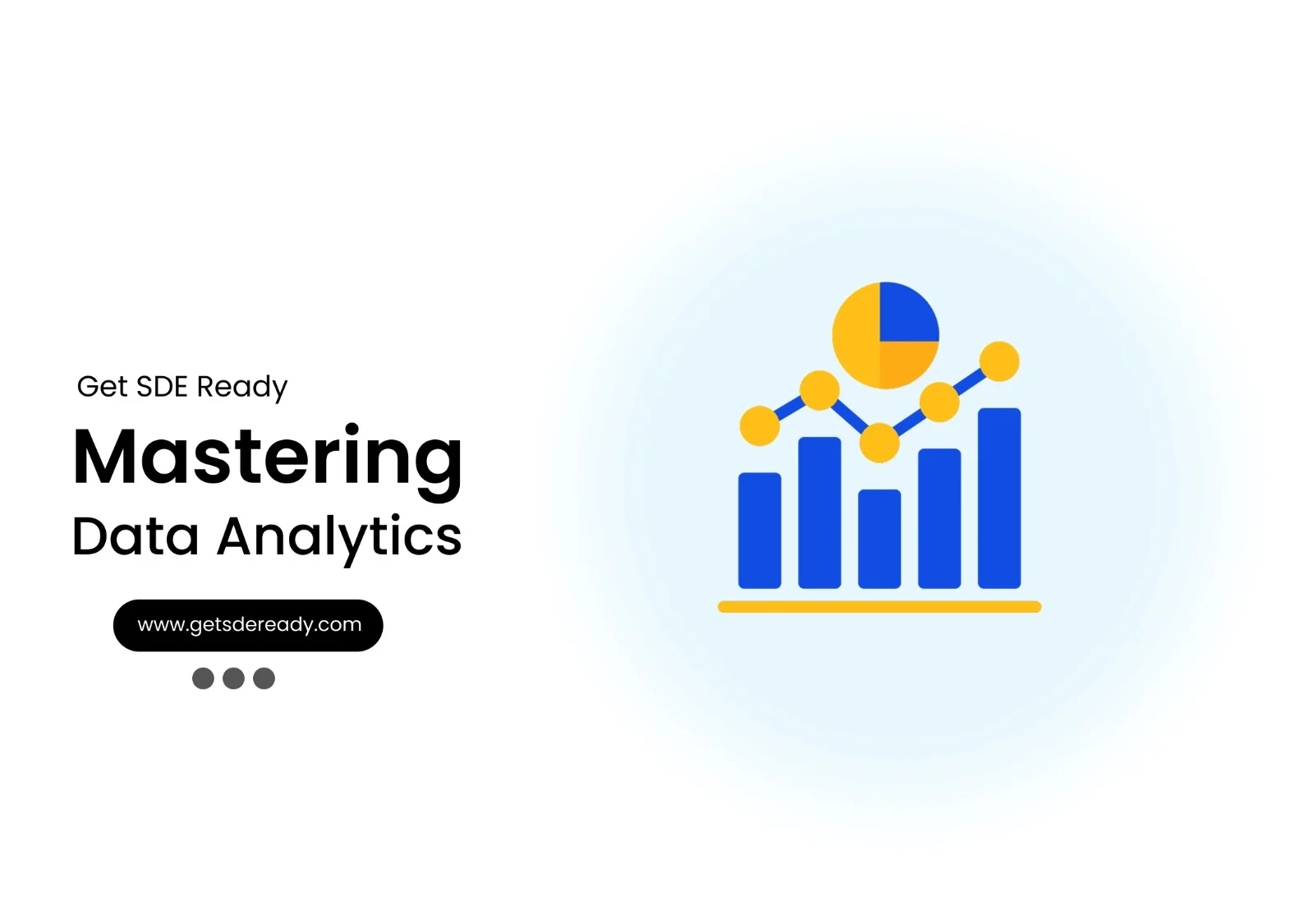
Data Analytics
- 20+ Live Classes & Recordings
- 24*7 Live Doubt Support
- 15+ Hands-on Live Projects
- Comprehensive Notes
- Real-world Tools & Technologies
- Access to Global Peer Community
- Interview Prep Material
- Placement Assistance
Buy for 70% OFF
₹9,999.00 ₹2,999.00
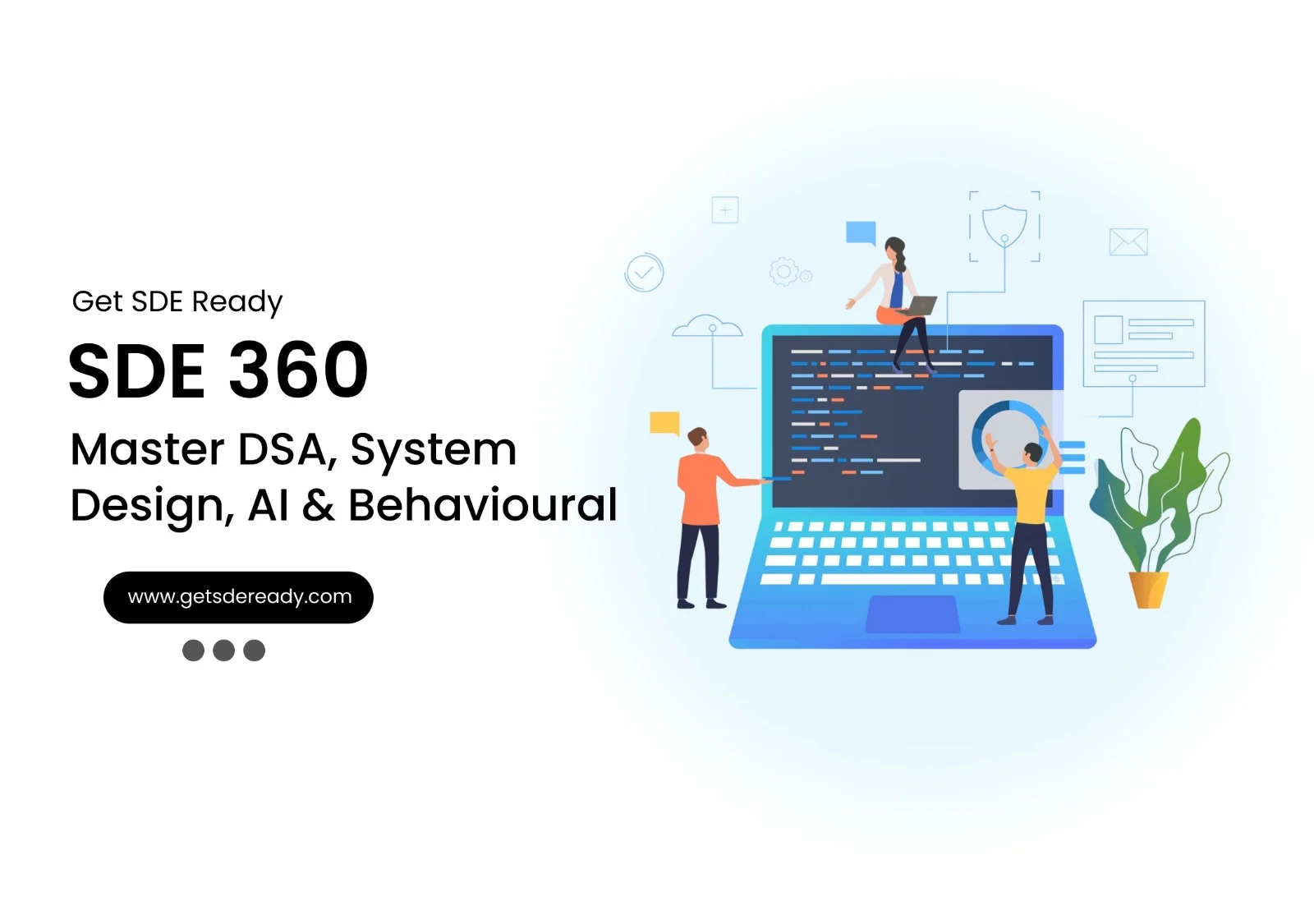
SDE 360: Master DSA, System Design, AI & Behavioural
- 100+ Live Classes & Recordings
- 24*7 Live Doubt Support
- 400+ DSA Practice Questions
- Comprehensive Notes
- HackerRank Tests & Quizzes
- Topic-wise Quizzes
- Case Studies
- Access to Global Peer Community
Buy for 50% OFF
₹39,999.00 ₹19,999.00
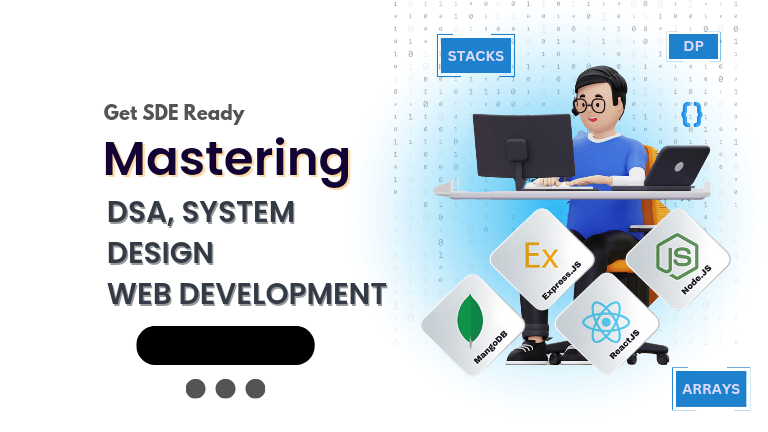
Fast-Track to Full Spectrum Software Engineering
- 120+ Live Classes & Recordings
- 24*7 Live Doubt Support
- 400+ DSA Practice Questions
- Comprehensive Notes
- HackerRank Tests & Quizzes
- 12+ live Projects & Deployments
- Case Studies
- Access to Global Peer Community
Buy for 51% OFF
₹35,000.00 ₹16,999.00

DSA, High & Low Level System Designs
- 85+ Live Classes & Recordings
- 24*7 Live Doubt Support
- 400+ DSA Practice Questions
- Comprehensive Notes
- HackerRank Tests & Quizzes
- Topic-wise Quizzes
- Case Studies
- Access to Global Peer Community
Buy for 52% OFF
₹25,000.00 ₹11,999.00
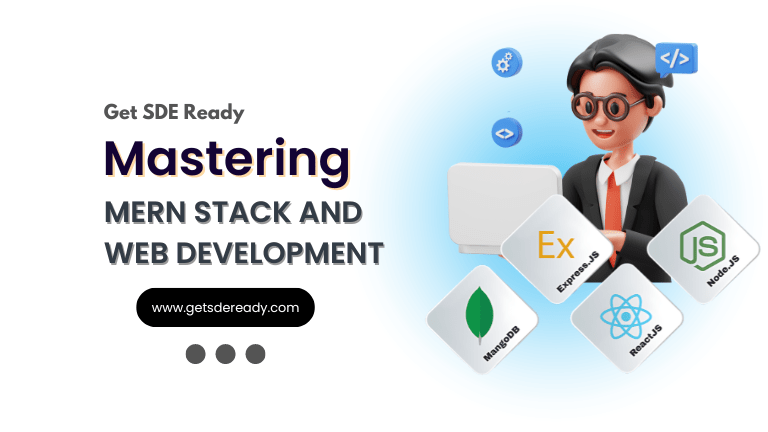
Mastering Mern Stack (WEB DEVELOPMENT)
- 65+ Live Classes & Recordings
- 24*7 Live Doubt Support
- 12+ Hands-on Live Projects & Deployments
- Comprehensive Notes & Quizzes
- Real-world Tools & Technologies
- Access to Global Peer Community
- Interview Prep Material
- Placement Assistance
Buy for 53% OFF
₹15,000.00 ₹6,999.00
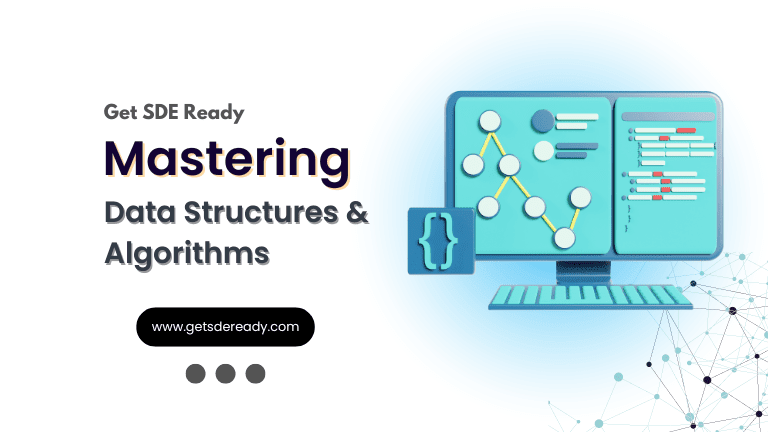
Mastering Data Structures & Algorithms
- 65+ Live Classes & Recordings
- 24*7 Live Doubt Support
- 400+ DSA Practice Questions
- Comprehensive Notes
- HackerRank Tests
- Access to Global Peer Community
- Topic-wise Quizzes
- Interview Prep Material
Buy for 40% OFF
₹9,999.00 ₹5,999.00
Reach Out Now
If you have any queries, please fill out this form. We will surely reach out to you.
Contact Email
Reach us at the following email address.
arun@getsdeready.com
Phone Number
You can reach us by phone as well.
+91-97737 28034
Our Location
Rohini, Sector-3, Delhi-110085